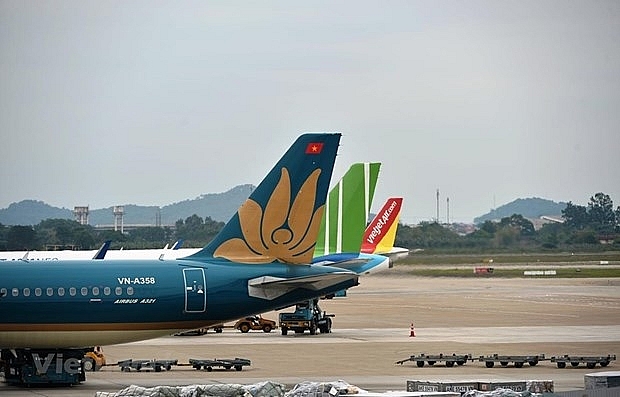Transport businesses raise fares due to fuel costs
 |
The consolidated financial statements of Vietnam Airlines for the first quarter reported just over $504 million in total consolidated revenues of the leading airline, up 55 per cent on-year. However, its gross loss was almost $70 million and its pre-tax loss was $114 million.
Vietnam Airlines explained that the first-quarter business results still reflected the heavy impact of the pandemic even at the beginning of this year.
The international market was almost frozen in the first quarter. The negative impact of global events and high fuel prices meant that airline businesses could not recover well.
The first-quarter financial report of FLC Group JSC – the company that owns Bamboo Airways – reported a loss of about $30 million and the new player Vietravel Airlines lost about $6 million.
The only Vietnamese airline that made a profit in the first quarter was Vietjet with a pre-tax profit of nearly $11 million – an increase of 117 per cent on-year, which mainly came from financial investments. Passenger transport activities recorded a gross loss of just over $11 million.
An expert in the aviation industry said that fuel costs account for the largest proportion of operating costs – about 30-40 per cent. Fuel costs in May increased by over $54 per barrel compared to the expectation, so total fuel costs in the month increased by $25 million.
With the current operating output, the total fuel cost for the year will increase by up to $270 million compared to the annual operation budget.
"The concern of any airline at this time is that the fuel price shock will dent its profits," said the expert.
Since early May, Ho Chi Minh City-Hanoi flights have often cost at least $65.20 one way, and Ho Chi Minh City-Danang flights have been at least $74 one way – an increase of 30 per cent over the last year's cheap tickets.
A representative of an airline said, “Domestic routes have grown very well, but the international market has not yet prospered. At this time, every company is struggling with the price of fuel, so it is difficult to compete on price. We have to keep tickets at a high price to reimburse the costs."
In addition to aviation, road transport enterprises are also struggling.
Le Trung Tinh, chairman of the Ho Chi Minh City Association of Tourism and Intercity Passenger Car Transport, said that despite steady prices, transport businesses have all enabled fuel price surcharges.
However, these companies cannot raise the trip costs too much because people's spending power is still lower than before the pandemic. High prices will not lure many passengers and companies' revenues will drop.
Gasoline accounts for 25-40 per cent of the total costs of transportation companies, so the more fuel prices increase, the more difficulties businesses are facing.
“Besides raising fares, transport enterprises are also applying additional measures to tighten their expenses such as restructuring operations, reducing the scope of operations, and asking drivers not to run at high speeds to save fuel. They are waiting for more drastic actions from the government like reducing taxes and other fees," Tinh said.
What the stars mean:
★ Poor ★ ★ Promising ★★★ Good ★★★★ Very good ★★★★★ Exceptional
 Tag:
Tag:
Related Contents
Latest News
More News
- Opella and Long Chau join forces to enhance digestive and bone health (February 06, 2026 | 18:00)
- Vietnam-South Africa strategic partnership boosts business links (February 06, 2026 | 13:28)
- Sun PhuQuoc Airways secures AJW Group support for fleet operations (February 06, 2026 | 13:23)
- Pegasus Tech Ventures steps up Vietnam focus (February 05, 2026 | 17:25)
- The generics industry: unlocking new growth drivers (February 04, 2026 | 17:39)
- Vietnam ready to increase purchases of US goods (February 04, 2026 | 15:55)
- Steel industry faces challenges in 2026 (February 03, 2026 | 17:20)
- State corporations poised to drive 2026 growth (February 03, 2026 | 13:58)
- Why high-tech talent will define Vietnam’s growth (February 02, 2026 | 10:47)
- FMCG resilience amid varying storms (February 02, 2026 | 10:00)



























 Mobile Version
Mobile Version